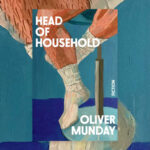French readers appreciate superb writing, especially superb noir, especially when that noir is from the US. This has been proven time and again in the post-war period, but it first came to my attention in 2008 when I started reading New Jersey-based author, Mark SaFranko. I became a fan of his work and was surprised he wasn’t more popular in his home country. Then I learned he had a huge following in France. That story repeated itself a few times in the following years, and eventually I accepted a blanket truth: the French have great taste in books. Now, after years of being an author and a reviewer, I know more about publishing than I did back when I first read SaFranko or learned the extent to which the French love Harry Crews. I also know many more American writers with thriving careers in France. So I thought, why not ask them what they think this French love of American noir is all about?
The perfect example of this cultural phenomenon may be Benjamin Whitmer and his latest novel, Evasion, published by Gallmeister, a French publisher specializing in American noir and nature literature. Evasion has been nominated for awards and recently became a bestseller in France; it hasn’t been published in the US. Let that sink in. Whitmer, author of Pike and Cry Father, is one of the finest purveyors of noir in this country, and francophones are enjoying his latest while American publishers are sleeping on it.
Whitmer was the starting point in my quest to find out the main differences between American and French publishing and, perhaps more importantly, book culture. I asked him why he thought American noir appeals to French readers.
“To be honest, I’m not sure it’s especially a French thing. I think people all over the world read noir, read tragedy,” said Whitmer. “The only place where there is no place for noir or tragedy is America. As David Vann said, ‘We have the idea in America that a book should have likable characters and make us feel good by the end. This is a new and idiotic idea and erases 2,500 years of literary culture.’ No other culture is dumb enough to believe that. That takes a specifically pathological self-concept and denial of reality.”
Laura Lippman, the New York Times bestselling author of Sunburn, After I’m Gone, and many others, thinks the French obsession with American writers stems from their love of stories that depict the country as they imagine it, and not because of American noir’s gloomy, violent nature.
“I think other countries like fiction that presents the US as they think it is,” said Lippman. “And while noir is a big part of that, so is what I’ll call suburban suspense, the kind of novels that won Harlan Coben such a huge following in France.”
While I don’t disagree with Lippman and Whitmer, I think there is a special place in the heart of French readers for noir. Even the term comes from them. While there are rumors that the term had been used since 1939, the most commonly accepted origin narrative traces it back to French film critic Nino Frank, who started using it in 1946 to refer to black and white Hollywood films influenced by American hardboiled fiction.
Jake Hinkson, author of The Blind Alley, No Tomorrow, and The Big Ugly, has had his work translated to French and has won the Grand Prix des Littératures Policières and the Prix Mystère de la Critique. Like Whitmer, Hinkson has been traveling to Europe as he cultivates success there. He agrees with Whitmer on one thing: the French love American noir because it illuminates the soul of the country, the real America.
“I think the French are fascinated with American noir because they’re fascinated by America,” said Hinkson. “They view noir as a body of literature that is critical and revealing of American culture. I don’t think the French have much respect for things that Americans think are classy (your average Oscar-bait movie, for instance), and they tend to be a little weary of all the stuff that is NYC-centric or overly LA. But they’ve always had a fascination with other parts of the country, the ‘real America’ if you will. That’s why the French were the first ones to the recognize the artistic merits of things like jazz and gospel. It’s why they embraced regional artists like Faulkner. And it’s why they were the first ones to recognize that guys like Thompson and Goodis weren’t just failed pulp writers but rather authentic and unique literary talents.”
“But they’ve always had a fascination with other parts of the country, the ‘real America’ if you will. That’s why the French were the first ones to the recognize the artistic merits of things like jazz and gospel.”William Boyle, author of Death Don’t Have No Mercy, A Lonely Witness and Gravesend, has also had his work translated into French and published by Gallmeister. He has been nominated to the Grand Prix de Littérature Policière and has traveled to France recently to participate in readings and festivals. He echoed Hinkson’s thoughts.
“They know that American noir presents a true portrait of this country, that it doesn’t hold back or hide things, that it isn’t afraid to search the dark corners,” said Boyle. “I think they know that noir has always told the truth about America—they were the ones who first sensed that. Also, they’re not turned off by unlikeable characters or unhappy endings.”
Unhappy endings. I love them. In fact, noir works best for me when there is no space for the bland, cliched happy endings that have become sine qua non elements of Hollywood movies and most formulaic crime and horror fiction nowadays. Perhaps the best explanation of this love for unflinching truth the French have comes from David Joy, author of The Line That Held Us and The Weight of This World, both of which have been translated to French and published by Sonatine Éditions.
“In my experience, French readers tend to be a braver lot,” said Joy. “I think the thing about good noir that’s hard for some folks is that it forces you to go to uncomfortable places and to confront uncomfortable things and a lot of readers just aren’t willing to do that. I think that’s particularly true of American readers. I say this because of the books that sell well in the States. I say this because of the criticisms I hear about books time and time again. For the most part, what moves in this country are airplane books—something I can pick up in a terminal, read on a flight, and toss in the trash before I catch a cab. It’s something to fill time more than it is something to challenge beliefs. I hear people say, ‘Well, I didn’t relate to the characters.’ I’m sorry, but I don’t believe relatability is a requirement of good literature. In fact, I believe the opposite. I believe good literature allows us to walk in the shoes of someone we might otherwise dismiss. For me, that statement about not relating to characters boils down to a refusal to venture into uncomfortable ground. That’s not something I’ve experienced with French readers. They tend to still want books that are challenging. They seem to still view literature as an instrument of critical thinking and change.”
***
So what is the main difference between France’s literary culture and our own? This was not something I had thought about from the beginning. Instead, this was a question that developed over time. The more I learned about French literary culture, the more I liked what they do and how they do it. When two French publishers started showing interest in my novels, I became really curious. The fact that publishers so far from here are aware of what’s happening in indie publishing in the US is a testament to how much they care about good books. Joy thinks French book culture is great because it’s part of their fabric as a society.
“Books just matter more,” said Whitmer. “Somebody over there once told me that the difference between their politics and ours is that we could never elect a politician who didn’t profess to believe in God, and they could never elect a politician who didn’t read. It’s baked into every part of their life. Reading and books are afforded an entirely different weight in France. They don’t have creative classes in France, because their conception of it is that it’s something too special to be taught. It can be a little unnerving as an author, but it means that they’ve gone to great lengths to protect their book culture, and not allowed it to become the almost entirely corporate entity ours has via Big 5 publishing and Amazon.”
“Somebody over there once told me that the difference between their politics and ours is that we could never elect a politician who didn’t profess to believe in God, and they could never elect a politician who didn’t read. It’s baked into every part of their life.”Meanwhile, Hinkson said that both cultures are vastly different in terms of what reading means and how it’s perceived. “Reading in France is a national obsession,” said Hinkson. “It’s a wholly different culture than the States. I mean, people go to college to be booksellers. It’s not just seen as a part-time job like it is here. It’s a profession. At book events, writers don’t read their work, they just discuss it with the audience. And the questions aren’t ‘Where do you get your ideas?’ or ‘What time of day do you like to write?’ It’s graduate-school level discussions of character and theme. It’s probing and personal. And, I mean, these questions are coming from regular people. Americans have always been suspicious of intellectuals. The French just…aren’t. They respect intelligence and expertise. They don’t have that ‘You think you’re better than me ‘cause you think you’re so smart’ chip-on-the-shoulder thing that we have here. For a writer, it’s extremely exciting.”
What Hinkson’s comments illuminate is that French readers, publishers, and booksellers love and respect books and the people who write them. They also take bookselling seriously and support bookstores. This was also something Lippman (“Books really matter in France”) and Boyle (“They value independent bookstores and booksellers in a way that just knocks me out”) both noted in their responses. Furthermore, the French also value literary festivals and treat authors like celebrities when they go over for an event.
That said, there are other elements at play that are part of the business side and that further separate both reading cultures. According to Joy, economics and reading practices play a huge part of it.
“For starters, the French consume more books,” said Joy. “You look at the statistics and the French are always in the top ten well-read countries in the world. They’re typically somewhere around number seven. The U.S., on the other hand, we’re lucky to make the top 30. People just don’t read here. In this country, one third of high school graduates never read another book for the rest of their lives. Forty-two percent of college graduates never read another book after college. Eighty percent of U.S. families did not buy or read a book last year. Seventy percent of U.S. adults have not been in a bookstore in the last five years. That’s staggering. What I love most about book culture in France, though, as opposed to the States, is the fixed pricing model. Retailers have to sell books for the listed cover price. What that’s done is stripped the privilege and advantages of bulk retailers like Amazon who are able to sell books for a fraction of the list price, and it has given that power back to the small independent booksellers who serve communities all over the country. Here in the U.S. it takes a deliberate choice to say, I’m willing to pay full retail so that my dollars stay within my community, and the fact is most Americans aren’t willing or are unable to make that choice. As a result, our independent bookstore culture has struggled to survive.”
The reason why French readers love American noir is not simple. In fact, there are multiple elements at play. Reading is engrained in French culture. Intellectualism is celebrated instead of made fun of and feared. Unhappy endings are accepted and even encouraged because they are understood to be part of life.
Reading is engrained in French culture. Intellectualism is celebrated instead of made fun of and feared. Unhappy endings are accepted and even encouraged because they are understood to be part of life.Noir shows the US in a negative light that reveals a lot of brutality, and that’s part of how the French imagine the underbelly of the country (and they are not wrong). French readers are fearless about bad things and crave fiction that shows the States as the hyper-violent place it is, especially for minorities, immigrants, and poor people—American noir delivers that. Every author interviewed for this piece writes superb, dark fiction, and they should be treated like celebrities here. Unfortunately, we need to change a few things about our book culture, starting with the tendency to dislike a narrative solely because it doesn’t have a happy ending.
I suggest we start working on those changes because, as it stands now, my response has morphed slightly: “Why do the French love American noir? It’s complicated, but to put it simply, they have better taste than us when it comes to books and treat writers the way they deserve.” Yeah, I know that’s a problematic answer, but maybe it gets the conversation going in the right direction. The first step? Go read these wonderful authors and let their darkness, which is our collective darkness, into you heart.

















